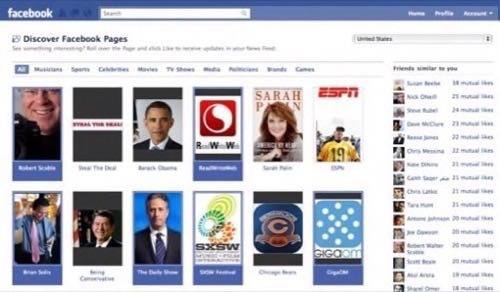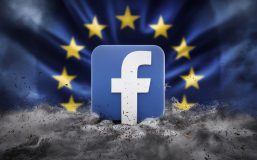What do you get when you combine the biggest collection of personal taste data in history with the world’s easiest method of subscribing to syndicated content? In theory, one of the most potent recommendation engines around. Facebook quietly made available to all its 500 million plus users a new feature today called the Page Browser and though everything about it is quite understated – it could prove to be a very big deal.

Users must navigate directly to the Page Browser, there doesn’t appear to be any link from the main interface. The page shows big icons for a list of pages Facebook thinks you might like; click on one and you’ll “Like” it. Of course Facebook has succeeded by making very potent interactions seem simple from the outside – and this new feature is more of the same.
Facebook could probably offer recommendations that were almost perfectly within your taste profile, but these recommendations aren’t and I’m guessing that’s intentional. Users would likely be frightened by just how effectively Facebook can predict their interests and it’s good to introduce people to a wider variety of topics than they would get if pure fidelity was the goal.

Everyone’s page looks a little different. I didn’t think mine looked very personalized, until I looked at the page in my wife’s account. (I was jealous of some of her recommendations.)
Recommendations are like the search you never knew you wanted to perform. If search engines defined, and funded, the last phase of the web – it seems quite likely that recommendation will play that role in the next phase of the web. All the more reason it’s strange that a feature like this is being treated so casually by Facebook.
What Facebook Means When it Says You “Like” Something
What does it mean to “Like” something in Facebook? It’s a simple action to take, but it means a whole lot.
Recommendation vs. Search
Recommendations are like the search you never knew you wanted to perform. If search engines defined, and funded, the last phase of the web – it seems quite likely that recommendation will play that role in the next phase of the web. All the more reason it’s strange that a feature like this is being treated so casually by the company.
- It means a user commits an act of brand evangelism, as the fact that they Liked what they did is broadcast out into the newsfeeds of all their friends.
- It means a user adds a link to that brand to their personal profile page, most likely forever. “Unliking” something is not made easy to do in the Facebook interface.
- Most important: To Like in Facebook parlance is to subscribe to updates from a publisher, indefinitely into the future. One click and updates from Britney Spears, or Radio Lab, appear side by side with baby pictures of your nieces and status updates from your Mom. And you just said you liked Britney Spears!
The Page Browser feature now gives you a continuously scrolling set of big pictures to reach out and click on. Click, click, click – subscribing to scores more feeds of updates from various publishers becomes easier than ever before.
It’s a very potent addition to the site. It will be interesting to see how much it catches on and how much Facebook pushes it. Is it just me or is an infinite scrolling page of big, colorful icons you can just push on to receive a future stream of high-quality links, messages and other personalized content delivered almost directly into your brain… like, the greatest thing you could ask for online?
Will brands bid to have their pages recommended to users with various demographic and taste profiles? That’s what Twitter is believed to be planning for user account recommendations on its site soon. We’ll have to watch and see what Facebook does.









